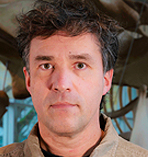Gilbert Morgan Smith Medal

Scheduled for presentation in 2024, recipients will be announced in January 2024. To get awards news straight to your inbox, make sure to sign up for our Connect with Awards newsletter.
About the Gilbert Morgan Smith Medal
The Gilbert Morgan Smith Medal recognizes excellence in published research on marine or freshwater algae. The award is presented every three years and consists of a gold-plated bronze medal and a $50,000 prize. The Smith Medal was established in March 1968 at the bequest of Helen P. Smith in memory of her husband, Gilbert Morgan Smith. Smith was a renowned botanist, a member of the National Academy of Sciences, and the first President of the Phycological Society of America.
Most Recent Recipient
 |
Patrick Keeling, University of British Columbia, received the 2021 Gilbert Morgan Smith Medal.
Keeling has established a broad evolutionary basis for investigating the molecular and evolutionary genomics of the diversity of the single-cell organisms known as protists.
Read more about Keeling's work»
Recipients:
Patrick Keeling (2021)
For leadership in developing, implementing and promoting ways to assess algal and protistan diversity, for investigations into the evolution of genomes of algal-derived organelles, endosymbionts and parasites and the role of gene transfer, for advances in algal systematics, and for deep insights into biochemical and genetic processes affecting global biogeochemistry.
Read more about Keeling's work»
Watch Keeling's acceptance speech»
Mark E. Hay (2018)
For developing algae as the major model for marine chemical ecology, and for elucidating how chemical cues and signals from algae structure marine and aquatic populations, communities, and ecosystems.
Read more about Hay's work»
Watch Hay's acceptance speech»
Takao Kondo (2015)
For demonstrating the occurrence of circadian clocks in prokaryotes, leading through genetic dissection to the discovery of the central bacterial clock genes, kaiABC, and to a new way of thinking about algal ecology.
Read more about Kondo's work»
Watch Kondo's acceptance speech»
John B. Waterbury (2012)
For the discovery and characterization of planktonic marine cyanobacteria, and viruses that infect them, setting in motion a paradigm shift in our understanding of ocean productivity, ecology, and biogeochemical cycles.
Arthur R. Grossman (2009)
For pioneering creative and comprehensive research on algae and cyanobacteria, elucidating molecular mechanisms by which they adapt to changes in light color and to nutrient stress.
Sabeeha Merchant (2006)
For her pioneering discoveries in the assembly of metalloenzymes and the regulated biogenesis of major complexes of the photosynthetic apparatus in green algae.
Sarah P. Gibbs (2003)
For her revolutionary concepts and evidence that constitute the foundation for the current theory of chloroplast evolution and the phylogenetic relationships of algae and plants.
Shirley W. Jeffrey (2000)
For her discovery and characterization of major algal pigments, their quantitative application in oceanography, and for providing phytoplankton cultures for international research.
Isabella A. Abbott (1997)
For her comprehensive investigations of the biogeography and systematics of marine algae in the eastern and central Pacific, with emphasis on Rhodophyta, the red algae.
Elisabeth Gantt (1994)
For her pioneering work in elucidating the supramolecular structure of the light-harvesting complexes and energy transfer in the photosynthetic apparatus of red and blue-green algae.
Jean-David Rochaix (1991)
For his elegant, inventive studies in Chlamydomonas using genetics along with cell and molecular biology to elucidate molecular mechanisms of chloroplast biogenesis, photosynthesis, and nuclear-chloroplast interactions.
Ruth Sager (1988)
For her key role in the developing our understanding of genetic systems in organelles though her studies of chloroplast inheritance in the green alga Chlamydomonas
Richard C. Starr (1985)
For his important work, which elucidated the sexuality of desmids and green algae. This was the first time the details of meiosis had been set forth for these groups.
Luigi Provasoli (1982)
For his excellence in phycology, especially for his work on the culture and nutrition of algae, and the influence of bacteria and organic substances on the morphology of larger algae.
William R. Taylor (1979)
For his outstanding contributions to the knowledge of the marine algae of Florida, the Caribbean Sea, the Northwestern Atlantic, and the tropical Pacific Oceans.

